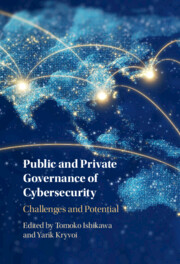Book contents
- Public and Private Governance of Cybersecurity
- Public and Private Governance of Cybersecurity
- Copyright page
- Contents
- Contributors
- Acknowledgements
- Abbreviations
- 1 Introduction
- 2 International Relations Perspectives
- 3 The State-Oriented Model of Internet Regulation
- 4 Cybercrime, the United Nations, Prospects, and Challenges for International Co-operation
- 5 Responding to Public and Private Cyberattacks
- 6 International Data Transfers and Cybersecurity
- 7 International Trade Law and Cybersecurity
- 8 Cyberthreats, Human Rights, and FDI Restrictions
- 9 Public–Private Partnerships on Cybersecurity and International Law
- 10 The Geopolitical Divide, Norm Conflict, and Public–Private Partnership in Cybersecurity Governance
- Index
7 - International Trade Law and Cybersecurity
Balancing Free Markets and Regulation
Published online by Cambridge University Press: 09 November 2023
- Public and Private Governance of Cybersecurity
- Public and Private Governance of Cybersecurity
- Copyright page
- Contents
- Contributors
- Acknowledgements
- Abbreviations
- 1 Introduction
- 2 International Relations Perspectives
- 3 The State-Oriented Model of Internet Regulation
- 4 Cybercrime, the United Nations, Prospects, and Challenges for International Co-operation
- 5 Responding to Public and Private Cyberattacks
- 6 International Data Transfers and Cybersecurity
- 7 International Trade Law and Cybersecurity
- 8 Cyberthreats, Human Rights, and FDI Restrictions
- 9 Public–Private Partnerships on Cybersecurity and International Law
- 10 The Geopolitical Divide, Norm Conflict, and Public–Private Partnership in Cybersecurity Governance
- Index
Summary
The chapter analyses how trade agreements balance liberalisation of digital trade with cybersecurity concerns. The chapter identifies the strengths, weaknesses, and ambiguities facing digital trade regulation in these agreements. As a way to address the tension between international trade law and cybersecurity, it examines security exception clauses in different trade agreements. It also analyses the efforts found in recent regional trade agreements to direct state parties to have regard to international standards concerning cybersecurity issues. It concludes that harmonisation of such standards would suggest the possibility of a greater coherence in cybersecurity governance.
Keywords
- Type
- Chapter
- Information
- Public and Private Governance of CybersecurityChallenges and Potential, pp. 161 - 184Publisher: Cambridge University PressPrint publication year: 2023

